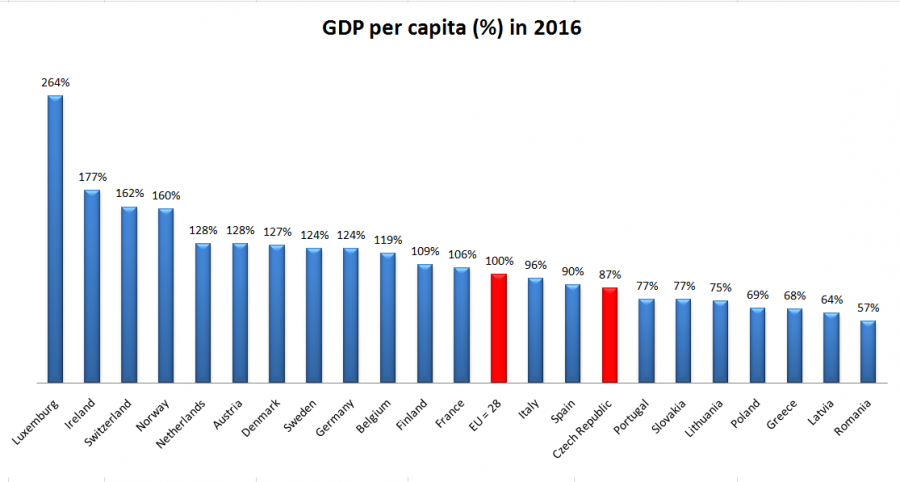
Why Are the Czech Salaries So Low?
The average EU citizen saw EUR 3.000 coming to his pocket every month of the last year (Eurostat, 2016) while the average Czech employee got mere EUR 1.000 per month (CZK 27.589). The difference is striking. To understand better why the Czech salaries continue to be low compared to other EU countries, we’ll look into a few economic processes.
Group #1
In this group we can place country such as Denmark. (e.g., the average salary in Denmark is around EUR 4.913 per month (CZK 132.750) which is 163% of EU average (UNECE Statistical Database, 2016).
What is happening in this group? Citizens earn more than their country’s economic performance allows.
Theoretically, the economic performance is not sufficient to cover peoples’ salaries in long term. One or the other factor will eventually have to adjust – either their economy will produce more wealth or people will find less money in their pockets.
Example:
Danish average salary = around EUR 4.913 per month = 163% of EU average.
Economic performance (calculated to purchase parity power per capita) = 127% of EU average
163% > 127%
The graph shows the economic performance of the European countries in 2016 as the percent of the EU 28 average. It is counted by GDP (Gross Domestic Products) per capita; it means how much country’s economy produces annually divided by the number of its citizens.

Group #2
Germany is the example of country where citizens’ earnings correspond to the economic performance. It means that their salaries match other economic indicators.
Example:
German average salary = around EUR 3.700 per month = 123% of EU average (Trading Economics, 2016).
Economic performance per capita = 124% of EU average
123% ~ 124%
Group #3
This group represents countries where citizens earn less than their state’s economic performance allows. Example of such country is the Czech Republic.
Example:
Czech average salary in 2016 was EUR 1.000 per month (Byznys.lidovky.cz, 2017).
Average salary = around 30% = around 1/3 of EU average salary
Czech economic performance = 87% of EU average
30% < 87%
The forecast is however very optimistic. In 2016 Czech salaries grew by 4.2% (by 3.5% regarding the inflation rate) and economists predict them to continue growing in 2017. The median salary in the last quarter of 2016 reached ~ EUR 900 (Czech Statistical Office, 2016). The median wage is the wage “in the middle” and is considered to reflect better the reality. That is, half of the workers earned below/above this level.
6 reasons why salaries are low:
Finally, let’s find out what causes the low salaries in the Czech Republic.
- Cheap export goods. The Czech economy is a small export economy, heavily depending on international demand.
- Strong position of heavy industry – companies invest in capital renewal instead of human labor, 38 % of Czechs work in the secondary sector – manufacturing and industry. With mere 59% of employees working in a tertiary sector (services), the Czech Republic stays behind other EU countries. Less people in services work only in Romania (44.5%) and Poland (57.5%).
- High social security contributions (among the highest % in EU). In average, we pay 57% in taxes, health insurance and social contributions.
- Psychological / historical motives. Weak position of trade unions. Czech people are reluctant / afraid to negotiate for higher salaries.
- Slow growth of labor productivity. The Czech productivity was on 76,2 % of EU average in 2014 while for example the labor productivity in neighboring Slovakia was on 82,6% of EU average in the same period.
- Capital pours abroad. Every year, approx. 200 milliard is paid by companies registered in CR to their foreign owners.
Sources:
Byznys.lidovky.cz 2017: Češi si o hodně polepšili. Mzda jim v průměru vyskočila na 29 tisíc at: http://byznys.lidovky.cz/cesi-si-o-hodne-polepsili-mzda-jim-v-prumeru-vyskocila-na-29-tisic-p8u-/moje-penize.aspx?c=A170310_093140_moje-penize_pave.
Ekonom.ihned.cz 2017: Proč mají Češi nízké platy? Může za to i česká ekonomika založená na průmyslu at: http://ekonom.ihned.cz/c1-65136060-proc-maji-cesi-nizke-platy-muze-za-to-i-ceska-ekonomika-zalozena-na-prumyslu.
Křeček, Š.: Kdy dostaneme pořádné platy? Journal Reflex, 05-17.
Kurzy.cz 2017: Mzdy – vývoj mezd, průměrné mzdy 2017 at: http://www.kurzy.cz/makroekonomika/mzdy/.
Reflex.cz 2016: 5 důvodů, proč máme nízké platy a mzdy at: http://www.reflex.cz/clanek/zpravy/76694/5-duvodu-proc-mame-nizke-platy-a-mzdy.html.
UNECE Statistical Database, 2016, compiled from national and international (OECD, EUROSTAT, CIS) official sources.
Submit your review | |
Oveall very good article. Just one small thing - milliard in English is billion :)

